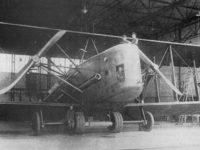The AEG R.I belonged to a project of super-heavy long-distance bombers, which were developed in mid-1918 and should be used for strategic bombardments.
Development and construction:
After the first medium-weight bombers had replaced the outdated airships as early as 1915, the German military commanders demanded the development of super-heavy bombers from 1917 onwards. These should have a much greater range than the middle bombers and also carry significantly more bombs.
The company AEG then began to build a three-track biplane, which should be equipped with four engines. These were mounted inside the fuselage so that repairs could be made during the flight, only the propellers were mounted between the wings. In the AEG R.I four Mercedes D IVa engines were used with 260 hp.
The first flight of the prototype succeeded on June 14, 1918 and despite the size of the aircraft could be flown very stable. After the presentation of the aircraft, the company got an order of another seven pieces.
On the test flight of the second aircraft on September 3, 1918, one of the propellers was destroyed whose glue was not yet cured. The plane crashed then and was completely destroyed.
Use in the First World War:
Of the total requested eight aircraft, only two were completed. An aircraft crashed during a test flight and a fourth aircraft was still under construction.
A deployment at the front could thus no longer take place and after the surrender had to be destroyed or delivered all bombers.
Technical specifications:
| Designation: | AEG R.I |
| Country: | German Empire |
| Typ: | Bomber |
| Length: | 19,5 meters |
| Span: | 36 meters |
| Height: | 6,35 meters |
| Mass: | 9000 kg empty |
| Crew: | Max. 7 |
| Engine: | four water-cooled inline engines Mercedes D IVa with each 260 hp |
| Maximum speed: | unknown |
| Reach: | unknown |
| Armament: | 5 x 7,92 mm Parabellum LMG 08/15 machine guns and up to 2000 kg bombs |
You can find the right literature here:
Fokker Dr I Aces of World War 1 (Aircraft of the Aces)
Undoubtedly the most famous fighter type to see service on either side during World War 1, the Fokker Dr I was a revelation when it entered service on the western front in 1917. Manfred von Richthofens JG 1 circus was the first Jasta to completely re-equip with the new fighter, and in the skilled hands of its numerous aces the Dr I proved a formidable opponent. The Dr I remained in service on the Western Front until replaced by the superior Fokker D VII in May 1918. Just weeks prior to that, however, Germanys leading ace, the great Red Baron, had been killed at the controls of a Dr I.
Friedrichshafen Aircraft of WWI: A Centennial Perspective on Great War Airplanes (Great War Aviation) (Volume 21)

Friedrichshafen Aircraft of WWI: A Centennial Perspective on Great War Airplanes (Great War Aviation) (Volume 21) Paperback – February 16, 2016
This book describes and illustrates the development of Friedrichshafen aircraft of WWI with text, 540 photos, 18 in color, 37 color profiles, production quantities and serial numbers of aircraft, and aircraft dimensions and performance specifications. In addition, there are 26 official SVK drawings and 11 aircraft are illustrated in scale drawings to 1/48 (4) or 1/72 (7) scales. The book has 312 pages and is of interest to aviation historians, enthusiasts, and modelers alike.
German and Austro-Hungarian Aircraft Manufacturers 1908-1918
Much has been written about the British aircraft of the First World War, but little has surfaced about the aircraft of the Axis powers, Germany and Austria. Here, Terry C. Treadwell tells the story of the aircraft from companies such as Fokker, builder of the famous triplane, as fl own by Baron von Richthofen's Flying Circus, AEG, Albatros, Junkers and Hansa. From reconnaissance aircraft to state-of-the-art bombers that could reach London, this is the definitive guide to aircraft of the Axis powers during the First World War. The aircraft are explained in detail and a history of each company is provided, making this an excellent source book for aircraft enthusiasts, model makers and those interested in the air war over the trenches of France and Belgium, as well as further afield in the Italian campaign.
The Zeppelin in Combat: A History of the German Naval Airship Division
The standard reference now revised and expanded. Dr. Robinson has opened up his vast photo archives to enhance this new edition of his classic work. Much of the new photographic material is published here for the first time.
This post is also available in:
 Deutsch (German)
Deutsch (German)  Français (French)
Français (French)  Italiano (Italian)
Italiano (Italian)  简体中文 (Chinese (Simplified))
简体中文 (Chinese (Simplified))  Русский (Russian)
Русский (Russian)  Español (Spanish)
Español (Spanish)  العربية (Arabic)
العربية (Arabic)














